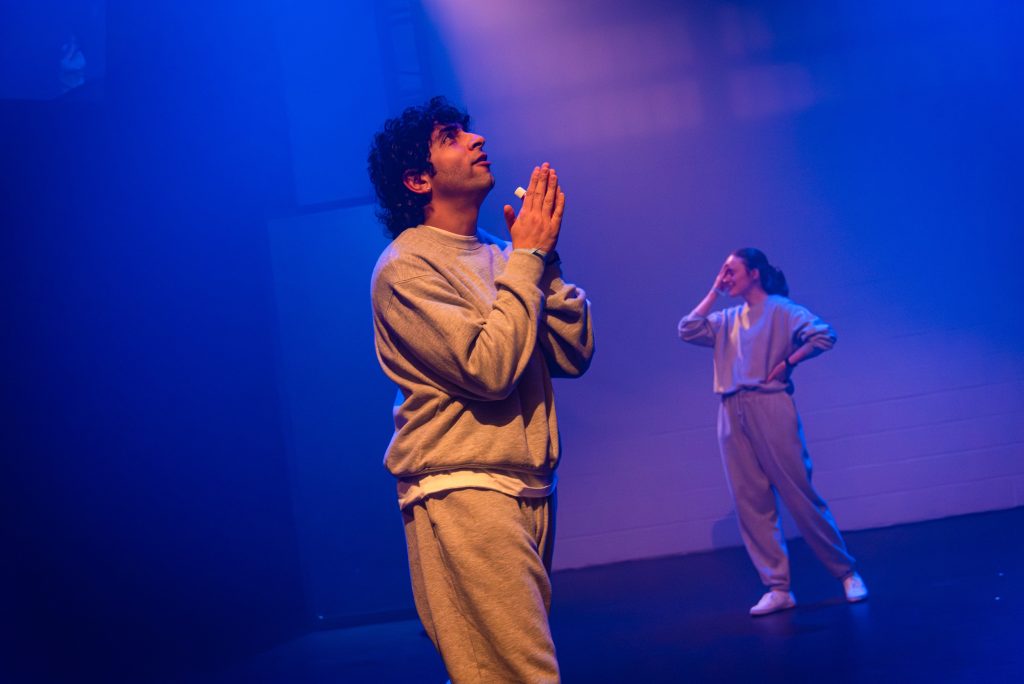
Credit: Chelsey Stuyt
Progress Lab (1422 William Street) to November 22, 2025
Tickets from $25 at www.rumble.org
Posted November 9, 2025
This might be the strangest love story you’ve ever seen – if it is a love story.
In this play by British, Emmy award-winning Lucy Prebble, Connie (Paige Louter) and Tristan (Andy Kalirai) are volunteers in a clinical trial of a new dopamine-regulating antidepressant. Connie is a psychology student; Tristan is a bit of a lost soul, not sure where he’s going. Chemistry between them? None. But as the trial proceeds with regularly increasing dosages, they are more and more attracted to each other. Is it just the drug? It matters to Connie if it is or not; to Tristan, not so much. And is it lust or is it love – a question many of us have asked ourselves at some point in our life.
The trial is being overseen by Dr. Lorna James (Meghan Gardiner), hired by Dr. Toby Sealey (Anthony Santiago), head of a pharmaceutical research lab. It turns out they have history and, in a way, Lorna is also on trial.

Credit: Chelsey Stuyt
Directing for Rumble Theatre and ITSAZOO, Jiv Parasram brings the audience, seated on two sides of the performance area, very close to the action. A mostly bare stage with two plexiglass booths where Connie and Tristan change into sweats, gives the effect of us seeing something we should not be watching: Tristan and Connie as lab rats. It’s not clear exactly where they are; it appears to be a room where they are left alone. Are they being observed?
The Effect raises all sorts of questions not the least of which are the ethical issues surrounding drug testing. Are volunteers really made aware of the possible side-effects, given that those administering the drugs don’t know? And as consumers of drugs, are we culpable for the volunteers who might suffer long-lasting issues after the tests conclude? And who are these volunteers? The poor? The vulnerable?

Credit: Chelsey Stuyt
But The Effect also questions the very nature of love. Is it simply neurochemistry: the giddy, heart-pounding, hyper-awareness that comes with falling in love? Is the ‘heart’ involved at all?
It might be wishful thinking, but I think the final scenes suggest the playwright believes there is love beyond dopamine. Of course, it could just be guilt in the case of Connie and Tristan.
The intensity of this theatre experience is extremely heightened by the minimalist staging (by Monica Emme), lighting (Phil Miguel) and stellar performances. Louter and Kalirai are initially like two, ordinary young adults – playful, teasing, testing each other. Kalirai, as Tristan, tries to woo Connie with an improv dance; Louter, as Connie, responds with laughing and the two end up dancing. But as the dosages relentlessly increase, their relationship – and it is now a relationship – Louter and Kalirai turn up the heat. Intimate scenes are tastefully choreographed by Lisa Goebel.

Credit: Chelsey Stuyt
As Lorna, Gardiner is all efficiency, handing out the pills, checking to see that they have been swallowed. Her Lorna is an objective, professional observer. But objectivity begins to break down when Toby turns up to see how the test is going. Gardiner takes her character on an emotional journey that is as searing as the one Connie and Tristan experience.
If there is a villain, and The Effect is, after all, a thriller of sorts, it’s Dr. Toby Sealey. Santiago’s Toby is unshakeably confident, even cocky and unperturbed at the havoc the drug is wreaking on Connie and Tristan. The bottom line: if, as Toby says, this drug is “Viagra for the heart”, there is money to be made. Lots of money.
While The Effect mostly rings brutally true, there are reality leaps in the script that work against the situation’s authenticity; when Tristan and Connie tear off their monitors, surely alarm bells should go off somewhere. And there are several times when the test should have been stopped, when protocol was broken or when aggressive behaviour was exhibited. Eventually I had to let go and accept that the playwright offers us a metaphorical or Kafka-esque situation in direct contrast to the very real data that we see projected on the screen: the heart rate, the number of milligrams, etcetera.

Credit: Chelsey Stuyt
In fairytales and folktales – even in the works of Shakespeare – humankind has always sought shortcuts to love, for ‘love potions’ that take the possibility of failure out of wooing. Is a psychiatrist issuing a dopamine-regulating drug that far removed from an apothecary with a little bag of herbs or a bartender pouring an extra shot? Remember the old rhyme: “Candy is dandy/but liquor is quicker.”
Prebble’s play raises all sorts of interesting questions about love, desire, neuroscience and the ethics of pharmaceutical testing. Seeing The Effect may change the way you reach for your meds whatever they are. Who (or what) suffered so we might live with little or no physical or mental distress?
Provocative and sometimes funny – although increasingly less so as Connie and Tristan descend into their drug-induced state – The Effect is in-your-face theatre that will leave you with more questions than answers.

